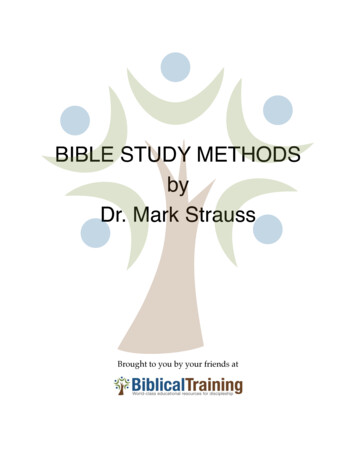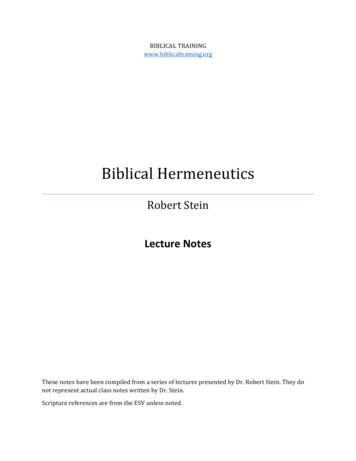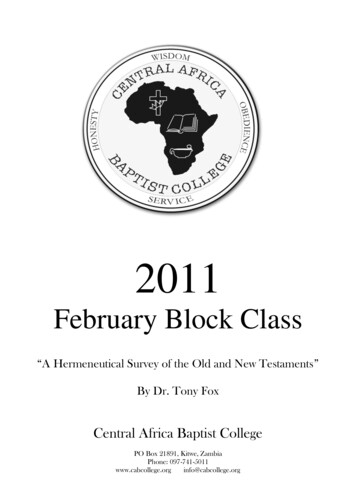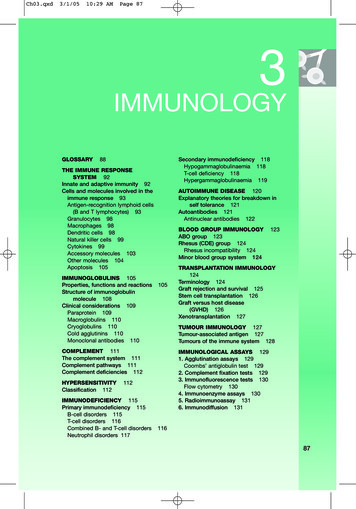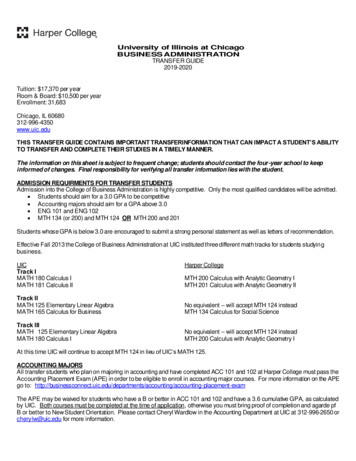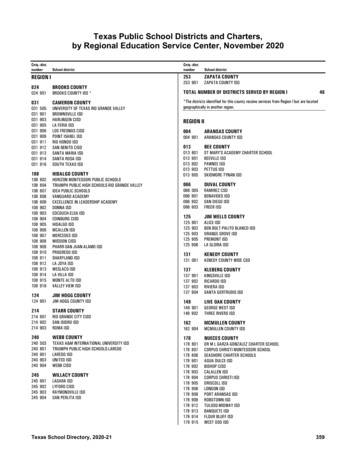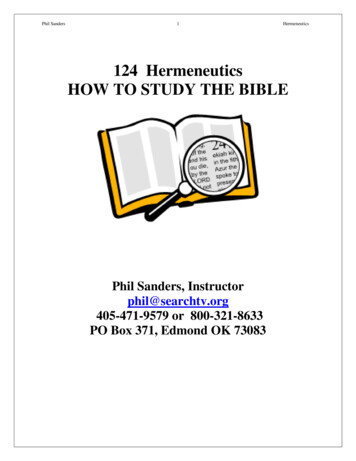
Transcription
Phil Sanders1Hermeneutics124 HermeneuticsHOW TO STUDY THE BIBLEPhil Sanders, Instructorphil@searchtv.org405-471-9579 or 800-321-8633PO Box 371, Edmond OK 73083
Phil Sanders2HermeneuticsHermeneutics 1Asian Christian University2015Purpose of this class:Hermeneutics is the skill and art of interpretation and is especially applied to the Bible.Any teacher of God’s word should know the fundamentals of proper Biblical interpretation. Thestudent will learn the proper methods of interpreting Scripture.Course Objectives:1. The student will demonstrate an understanding of the basic rules and principles of Biblicalhermeneutics.2. The student will demonstrate knowledge of the different literary genres of Scripture.3. The student will demonstrate knowledge of figures of speech in the Bible.Course Requirements:Students are required to attend class. Three unexcused absences will render the studentineligible to pass this course. Weather, work, illness, and church activities are bases for anexcused absence. An open-note, take-home exam will be given mid-term and at the end of thesemester. Students who miss classes are responsible for reading the distributed material.A 5-6 page paper is required, containing no less than ten resources in addition to theBible. Sources must include no less than five of the books cited in the Recommended andAdditional Reading. The student should demonstrate that he/she understands the hermeneuticprinciples pertaining to the topic of the paper. A list of suggested topics is included in thesyllabus. Papers should be done according to Chicago standards.Class Schedule:6/226/25Introduction to Hermeneutics (1-5)Basic Principles of Hermeneutics (6-8)6/297/2Periods of Bible History (9-10)Understanding Context7/67/9Can We All Understand the Bible AlikeUnderstanding History and Narratives;7/137/16Understanding Poetry and WisdomUnderstand the Writing Prophets7/207/23Understanding the GospelsUnderstand the Parables7/277/30Understanding the EpistlesUnderstanding Apocalyptic Literature
Phil Sanders8/38/63Distinguishing the Cultural from the EternalBiblical TypologyMid-term Exam given out8/108/13The Restoration PleaPatterns for the Church8/178/20The Silence of the ScripturesHermeneutic Principles in Deuteronomy8/248/27Jesus and ObedienceCommand, Example, and Necessary Inference I9/59/8Command, Example, and Necessary Inference IIGeneric and Specific CommandsTerm Paper due9/129/15Expediency and TraditionSalvation Issues9/199/22A Guide to Biblical ExegesisFigures of Speech9/269/29HermeneuticsScripture TwistingFinal ExamExegetical FallaciesRecommended Reading: Dungan, D. R. Hermeneutics. Delight, Ark.: Gospel Light Publishing, n.d. Lockhart, Clinton. Principles of Interpretation. Delight, Ark.: Gospel Light Publishing,1915. Kearley, Furman F., Myers, Edward P. and Hadley, Timothy D., eds. BiblicalInterpretation Principles and Practice. Grand Rapids, Mich.: Baker, 1986. Thomas, J. D. Harmonizing Hermeneutics. Nashville: Gospel Advocate, 1991. Thomas, J. D. Heaven’s Window. Abilene, Tex.: Biblical Research Press, 1974. Thomas, J. D. We Be Brethren. Abilene, Tex.: Biblical Research Press, 1958. Hightower, Terry M., ed. Rightly Dividing The Word: General Hermeneutics. Moore,Okla.: National Christian Press, 1993. Warren, Thomas B. When Is An Example Binding? Jonesboro, Ark.: National ChristianPress, 1975.Additional Reading: Carson, D. A. Exegetical Fallacies. Grand Rapids: Baker, 1984. Kaiser, Walter C. and Silva, Moises. An Introduction to Biblical Hermeneutics. GrandRapids: Zondervan, 1994.
Phil Sanders 4HermeneuticsRamm, Bernard. Protestant Biblical Interpretation. Boston: W. A. Wilde, Pub., 1956.Corley, Bruce; Lemke, Steve; and Lovejoy, Grant I. Biblical Hermeneutics. Nashville:Broadman and Holman, 2002.Terry, Milton S. Biblical Hermeneutics. Grand Rapids: Zondervan, 1974.Mickelson, A. Berkley. Interpreting the Bible. Grand Rapids: Eerdmans, 1963.Virkler, Henry A. Hermeneutics: Principles and Processes of Biblical Interpretation. GrandRapids: Baker, 1981.Fee, Gordon D. New Testament Exegesis. Philadelphia: Westminster Press, 1983.Fee, Gordon D. and Stuart, Douglas. How to Read the Bible for All Its Worth. Grand Rapids:Zondervan, 1982.Marshall, I. Howard, ed. New Testament Interpretation: Essays on Principles and Methods.Grand Rapids: Eerdmans, 1977.Witherington, Ben III. Reading and Understanding the Bible. New York: Oxford UniversityPress, 2015.Suggested Term Paper Topics:Lifting Hands in PrayerHow Many Containers Should We Use in Communion?Should Christians Partake of Communion Every First Day of the Week?Generic and Specific AuthorityThe Sin of Nadab and AbihuMay Churches Be a Sponsoring Congregation for a Missionary?May Churches Provide Benevolence for Non-Members of the Church?Greeting One Another with a Holy KissWhy We Do Not Use Instrumental MusicWhy We Do Not Have Roasted Lamb as Part of the Lord’s Supper
Phil Sanders5HermeneuticsIntroduction to HermeneuticsEzra 7:10 For Ezra had set his heart to study the law of the Lord and to practice it, and toteach His statutes and ordinances in Israel.Nehemiah 8:8 They read from the book, from the law of God, translating to give the senseso that they understood the reading.Acts 17:11 Now these were more noble-minded than those in Thessalonica, for theyreceived the word with great eagerness, examining the Scriptures daily to see whether these thingswere so.2 Tim. 2:15 Be diligent to present yourself approved to God as a workman who does notneed to be ashamed, accurately handling the word of truth.Definitions:1. Hermeneutics deals with the principles of interpretation.1 Some call it the science ofinterpretation; others prefer to speak of it as the art of interpretation. Bernard Ramm said, “It isa science because it is guided by rules within a system; and it is an art because the applicationof the rules is by skill, and not by mechanical imitation.”2 The word hermeneutics is derivedfrom “Hermes,” the Greek god who brought the messages of the gods to the mortals, and wasthe god of science, invention, eloquence, speech, writing, and art. Hermeneutics involvesdetermining the correct interpretation of the Bible. Milton S. Terry notes: “The word is usually applied to the explanation of written documentsand may therefore be more specifically defined as the science of interpreting an author’slanguage. This science assumes that there are divers modes of thought and ambiguities ofexpression among men, and accordingly, it aims to remove the supposable differencesbetween a writer and his readers, so that the meaning of the one may be truly and accuratelyapprehended by the others.”3 Henry A. Virkler said, “It [hermeneutics] is considered an art because communication isflexible, and therefore a mechanical and rigid application of rules will sometimes distort thetrue meaning of a communication. To be a good interpreter one must learn the rules ofhermeneutics as well as the art of applying those rules.”4 D. R. Dungan said, “Sacred hermeneutics is the science of interpreting the Scriptures.Exegesis means to lead out. It is the application of the principles of hermeneutics inbringing out the meaning of any writing which might otherwise be difficult to understand.”52. Exegesis is applied hermeneutics. Exegesis seeks an historical investigation into the meaning ofthe Biblical text. Exegesis answers the question, “What did the Biblical author mean?” It has todo both with what he said (the content itself) and why he said it at any given point (the literarycontext). Furthermore, exegesis is primarily concerned with intentionality: What did the author1Walter C. Kaiser and Moises Silva, An Introduction to Biblical Hermeneutics (Grand Rapids, Mich.: Zondervan,1994), p. 15.2Bernard Ramm, Protestant Biblical Hermeneutics (Boston: W. A. Wilde Co., 1956), p. 1.3Milton S. Terry, Biblical Hermeneutics (Grand Rapids, Mich.: Zondervan, 1968), p. 17.4Henry A. Virkler, Hermeneutics: Principles and Processes of Biblical Interpretation (Grand Rapids, Mich.: Baker,1981), p. 16.5D. R. Dungan, Hermeneutics (Delight, Ark.: Gospel Light Publishing Co., n.d.), p. 1.
Phil Sanders6Hermeneuticsintend his original readers to understand?6 Exegesis is the methodological approach to aScripture, so that one may come to understand what the passage meant as the author wrote itand as the original readers understood it. Exegesis implies that the explanation of the text hasarisen from careful, detailed analysis. Exegetes pay attention both to the language of the textand the specific historical, cultural circumstances from which it arises.Some Presuppositions of Christian Hermeneutics1. God has spoken in the Holy Scripture. Our faith rests in the certainty that God has inspired theBiblical text; and, as a consequence, that text partakes of the inerrancy of His very nature.2. The Scriptures are capable of being understood (the perspicuity of Scripture). While there aresome passages hard to understand (2 Pet. 3:16), the authors give every indication that theylargely intended to be understood (Luke 1:1-4; Eph. 3:1-4; 2 Pet. 1:12-19).3. The primary need of hermeneutics is to ascertain what God has said and to determine themeaning of the Word of God.4. The best means of understanding Scripture properly is to ascertain what the authors intendedthe readers to know. In order to do this, the interpreter must have some knowledge of thelanguage the authors used and the historical and cultural circumstances which influenced eachdocument. Further, interpreters must have some knowledge of the different kinds or genres ofliterature contained in the Bible.5. The sixty-six books of the Old and New Testament have been demonstrated to be the truecontent of Sacred Scripture.6. Interpreters must not add or take away from the Word of God but must determine what was theoriginal wording of Scripture. Interpreters must have some understanding of textual criticism,the means by which scholars determine what actually came from the pens of the originalauthors.7. God has not revealed some things to us, and some things we will not know in this life (Deut.29:29).Qualifications of an Interpreter1.2.3.4.5.6.7.8.Faith (Heb. 11:6)Love for the Truth (2 Thess. 2:10)Honesty (Prov. 23:23; Eph. 4:25; 1 Pet. 2:22)Humility (Jer. 9:23-24)Common SenseWillingness to study (Acts 17:11; 2 Tim. 2:15).Spiritual Purity (Titus 1:13-16; John 8:44-45)Willingness to listen to God first (2 Tim. 4:1-5; 1 Sam. 15:1-25)Needs of an Interpreter1. A correct translation is necessary for reliable exegesis.6Gordon Fee, New Testament Exegesis: A Handbook for Students and Pastors (Philadelphia: Westminster Press, 1983),p. 21.
Phil Sanders7Hermeneutics2. An understanding of language. Good interpreters find out the meaning of words, studygrammar, and investigate the historical, geographical and cultural circumstances surroundingany text. They also acquaint themselves with the means to understand various literary forms.3. Knowledge of logic or correct thinking.Things That Hinder Correct Interpretation1. A desire to please the world (James 4:4)2. Arrogance The belief that all one needs is the Bible to understand the Bible The belief that correct interpretation belongs only to the elite3. Reading the text without expecting or intending to understand it. Almost anything that menwant to do, they can find support in some text of Scripture (if they do not care how they use theBible).4. Efforts to harmonize the Bible with science or contemporary culture.Why Men Differ in Understanding the Bible7Laziness: Some do not study; they assume what they think the Bible should say based on poorknowledge. (2 Pet. 3:16-18; Ezek. 34:1-10; Hosea 4:6)Wishful thinking: Some want it to say something so badly they assume it does say it and reject otherviews--this is especially true of doctrines surrounding salvation. (1 Cor. 6:12-20; 1 Tim. 1:3,4;Matt. 7:21-23)Personal Prejudice: Some hold a doctrine because they have been taught it; the Pharisees held tothe tradition of their fathers and put it before the Law or Jesus. (John 7:47-49; 9:28-34; Mark 7:113)Unteachable because of pride: Some are unwilling to admit they are wrong and areunapproachable. (2 Pet. 2:10-20; 1 Tim. 6:3-5; Matt. 6:3)Emotional Bias: Some hold such a love for a teacher that they not consider that their mentor couldpossibly be wrong. Some have "Preacheritus!" There was only one Jesus Christ. (1 Cor. 1:10-13;Mark 3:1-6; 3:22-24)Vested Interest: Some teach what they are paid to teach, whether it is right or not.Titus 1:10-11; 1 Tim. 6:3,4; 2 Tim. 4:3,4Dishonest: Some have no integrity or regard for truth, so they handle the Bible dishonestly. (1 Tim.4:1-5; 2 Thess. 2:8-12; 2 Pet. 2:1-3; 2 Cor. 11:13-15)Faulty Logic: Some people do not reason correctly; they may miss the point; they may reachconclusions before they get all the facts; or they may not see the need for sound reasoning. (2 Pet.3:16; Mark 6:14-16; Luke 6:6-11; 1 Tim. 6:20-21)Lack of Thoroughness: Many people do not fully explore a subject before they form a doctrine intheir mind. There is a difference between a truth and the whole truth. (John 7:40-44; Matt. 22:2333)Regard for Human Authority: Some favor a teacher, a commentary, a church council, or a creedbook over plain Bible truths. (Matt. 15:1-14; Gal. 1:6-9; John 12:48)Self-deception: People when they select their beliefs have filters to keep out things they do not wishto believe. If one tells oneself a lie long and loudly enough, one will believe it. (2 Thess. 2:8-12; 2Tim. 4:3,4)7(J. D. Thomas, Heaven's Window, pp. 66-71.)
Phil Sanders8HermeneuticsBasic Principles of HermeneuticsCorrectly understanding the Scriptures means that there are certain, basic rules that must befollowed. The Bible must speak for itself and should never be made to say things that were neverintended by the writers. Solomon urges us to "Buy the truth and do not sell it, Get wisdom andinstruction and understanding" (Prov. 23:23). The Lord expects us to "be diligent to presentyourself approved to God as a workman who does not need to be ashamed, handling accurately theword of truth" (2 Tim. 2:15). Listed below are some basic instructions in how to understand theBible correctly.1. Familiarize yourself with the sixty-six books of the Bible. The Bible is actually a library ofbooks. Note that there is an Old Testament and a New Testament, which are written to differentaudiences. The OT addressed the nation of Israel or the Jews, while the NT is addressed toChristians, both Jews and Gentiles. The books of the Bible are written in different styles ofliterature: history, narrative, poetry, wisdom, prophetic, exhortation, and apocalyptic. The Biblewas written over a period of 1600 years by forty different authors who lived in a variety ofplaces. Each book has its own historical and cultural setting.2. Select good Bible study helps. It will help you greatly to acquire a Bible dictionary, a Bibleatlas, and a concordance. These tools will help you define people, places and things that may beunfamiliar to you. The concordance will give you the passages, which have the key terms youare studying.3. Read each individual passage in its context. Each passage of each book has a context in whichit is to be read an understood. Many passages are misunderstood because the reader has nevertaken time to investigate the context of the Scripture he is reading. Some questions he must askof the passage: Who is writing the passage?To whom is the author writing? Not everything in the Bible is written to every person. TheOT was written to Jews, and the NT was written to Christians.When was the passage written?What was the author's intent and purpose in writing? The direct or literal sense of a sentenceis the meaning of the author, when no other is indicated; not any figurative, allegorical, ormystical meaning.What circumstance may have prompted the writer to give rise to this lesson?What kind of literature is he using to make his message known?What are the historical and cultural circumstances that bear on this passage?What would this message mean to its original recipients?4. Learn to draw out the meaning of a passage; do not read into the passage anything that was notoriginally there. There is a difference between exegesis and eisegesis. Exegesis is the drawingout of the meaning of the passage. Eisegesis is the reading into the passage things that werenever there. Those who study the Bible must be careful not to read into it their own personalprejudices or concepts that they think ought to be in the Bible. One must read God's Word with
Phil Sanders9Hermeneuticsan open mind to learn what He has said and to understand the Bible for what it says for itself.The Bible is always its own best interpreter.5. Let the Bible explain itself. A difficult prophecy in Joel 2 finds its fulfillment in Acts 2. On theday of Pentecost, Peter said, "This is that which was spoken of by the prophet Joel" (Acts 2:16).In Eph. 4:4 Paul says that there is "one body"; this body is defined as the church (Eph. 1:22,23).In Rev. 1:20 John explains that the seven stars are angels or messengers and the seven goldenlampstands are the seven churches. There is no further need of wondering. The Bible is indeedits own best interpreter. A plain, clear passage should always be used to make the dark andabstruse passages clear. A difficult passage never denies or contradicts the plain teaching of theScripture.6. The Scriptures admonish us not to add or take away from what is revealed (Deut. 4:2; 12:32;Prov. 30:6; John 8:31,32; 2 John 9; Rev. 22:18,19). We must learn to stay within the teachingand observe the teaching carefully, completely, lovingly and accurately.7. The Scriptures do contain a law of inclusion and exclusion. We must do all that God commandsus to do (Matt. 28:19,20), yet we must also realize that specific commands exclude substitutesand additions. When God told Noah to build an ark of "gopher wood," this excluded all otherkinds of wood. When God gives us an instruction in general terms, He allows us to use ourcommon sense to fulfill that command in a variety of ways. For instance when God tells us to"go into all the world," He allows us to walk, run, swim, take a car, take a boat, take a plane,ride horseback, use a motorcycle, use a bicycle, or any other way that we choose. The goodBible student knows how to distinguish between general instructions and specific instructions.He accurately observes the specific.8. Take all that the Scriptures teach on any subject. All the truth on any one subject is not usuallyin one passage. There is a difference between a true statement and the whole truth of a matter.John 5:24 says, "Truly, truly, I say to you, he who hears My word, and believes Him who sentMe, has eternal life, and does not come into judgment, but has passed out of death into life." Itis true that we are saved by faith, but that is not the whole truth. Faith apart from repentance orbaptism will not save (Luke 13:3; Acts 2:38).9. Recognize figures of speech. There are many figures of speech in the Bible. Many problemsoccur because uninformed students interpret a passage literally when they should interpret itfiguratively. "It may truly be said that most of the gigantic errors have their root and source,either in figuratively explaining away passages which should be taken literally, or in takingliterally what has been thrown into a peculiar form or Figure of language: thus, not only fallinginto error, but losing the express teaching, and missing the special emphasis which theparticular Figure was designed to impart to them." (E.W. Bullinger, Figures of Speech, p. xvi.).10. One must come to the Word of God with the right attitude. Open-mindedness and humility areessential to good Bible study. The point of view that a miraculous event can't possibly havehappened will lead one to endless speculation. One must have a good and honest heart if one isto bring forth fruit with patience (Luke 8:15). Christians are to "buy the truth and not sell it"
Phil Sanders10Hermeneutics(Prov. 23:23) and so hold a high view of the truth. Christians must also come with a willingnessto apply what they learn to themselves.11. Apply the message of the Bible to your life. We ought to bring the message of the Bible homeby responding to the passage with our hearts and lives. Here are some questions we can ask theScriptures that will help us apply them to our lives: Does this command something I'm not doing? Does this suggest a change in my behavior? Does this reflect a spirit or an attitude I'm not manifesting? Does this confirm a belief I already hold? Does this suggest further study or a change in my beliefs? Have I accepted this promise and trusted God to fulfill it? Have I seen this promise fulfilled in my life? How would it change matters if everyone obeyed this command? What would Jesus do in my place?One has failed to bring home a passage if one has applied the truths of the Scripture to everyoneelse and neglected to apply them to oneself (Matt. 7:1-5).Eight Rules of Interpretation".the Eight Rules of Interpretation used by legal experts for more than 2500 years.1. Rule of Definition.Define the term or words being considered and then adhere to the defined meanings.2. Rule of Usage.Don't add meaning to established words and terms. What was the common usage in thecultural and time period when the passage was written?3. Rule of Context.Avoid using words out of context. Context must define terms and how words are used.4. Rule of Historical background.Don't separate interpretation and historical investigation.5. Rule of Logic.Be certain that words as interpreted agree with the overall premise.6. Rule of Precedent.Use the known and commonly accepted meanings of words, not obscure meanings forwhich their is no precedent.7. Rule of Unity.Even though many documents may be used there must be a general unity among them.8. Rule of Inference.Base conclusions on what is already known and proven or can be reasonably implied fromall known facts.
Phil Sanders11HermeneuticsFifteen Periods of Bible ptian bondageWildernessWanderingsConquest of CanaanJudgesUnited KingdomEventsfrom Creation to theFloodfrom the Flood to thecall of Abrahamcall of Abraham toEgyptian bondagedescent to Egypt toExodusfrom Exodus tocrossing Jordancrossing Jordan totime of Judgesfrom Judges to theKingdomFrom crowning Saulto the dividing ofKingdomTimeSpan1,656CharacterAdamScripture Involved in EachPeriodGenesis 1-5427NoahGenesis 6-11215AbrahamGenesis 12-45; Job215JosephGenesis 42 – Exodus 1140Moses51JoshuaExodus 12; Leviticus; Numbers;DeuteronomyJoshua 1-24305SamuelJudges 1 - 1 Samuel 8; Ruth120David1 Sam. 9 - 1 Kings 11; 1 Chron.10 - 2 Chron. 9;Psalms; Proverbs; Ecclesiastes;Song of Solomon1 Kings 12 - 2 Kings 20; 2Chron. 10-32; Joel; Isaiah;Micah; Amos; Hosea; Jonah;Obadiah2 Kings 21-25; 2 Chron. 33-36;Jeremiah; Nahum;2 Kings 25:8-21; Daniel 1-8;Ezekiel; Lamentations;Divided Kingdomfrom division ofKingdom to the fallof Israel (Samaria)253ElijahKingdom of Judahfrom fall of Israel tothe fall of Judahfrom fall of Judah tothe return toJerusalemfrom return toJerusalem to the endof Old Testamenthistoryfrom close of OldTestament toopening of NewTestamentfrom birth of Christ toAscensionfrom Ascension toclose of NewTestament history135Josiah50Daniel92EzraEzra, Nehemiah, Haggai,Zechariah, Esther, Daniel 9-12;Zephaniah; Malachi400JudasMaccabeusNo Scripture. History comesfrom Maccabees, Josephus,other sources.34JesusMatthew, Mark Luke, and John70PaulActs to RevelationBabylonian CaptivityRestoration of theJewsBetween theTestamentsLife of ChristThe Church
Phil Sanders12HermeneuticsThe Periods Connected to ScriptureBible PeriodAntediluvianPostdiluvianPatriarchalEgyptian BondageWilderness WanderingsConquest of CanaanJudges of IsraelUnited KingdomDivided KingdomKingdom of JudahBabylonian CaptivityRestoration of the JewsBetween the TestamentsLife of ChristThe ChurchScripture Involved in Each PeriodGenesis 1-5Genesis 6-11Genesis 12-45; JobGenesis 42 – Exodus 11Exodus 12; Leviticus; Numbers; DeuteronomyJoshua 1-24Judges 1 - 1 Samuel 8; Ruth1 Sam. 9 - 1 Kings 11; 1 Chron. 10 - 2 Chron. 9;Psalms; Proverbs; Ecclesiastes; Song of Solomon1 Kings 12 - 2 Kings 20; 2 Chron. 10-32; Joel; Isaiah; Micah; Amos;Hosea; Jonah; Obadiah2 Kings 21-25; 2 Chron. 33-36; Jeremiah; Nahum;2 Kings 25:8-21; Daniel 1-8; Ezekiel; Lamentations;Ezra, Nehemiah, Haggai, Zechariah, Esther, Daniel 9-12; Zephaniah;MalachiNo Scripture. History comes from Maccabees, Josephus, other sources.Matthew, Mark Luke, and JohnActs to RevelationPretexting?by Jack P. LewisThe old saying that "a prooftext is often a pretext" may be used as a starting point—to askthose of us who preach and teach whether we are expounding to our audiences the revelation ofGod or whether we are hanging our own ideas on convenient Scripture passages. The temptation topre-text is ever present in a community which feels that there must be a Biblical base for all that isdone in work and worship. We are not always clear about what falls in the necessary inferencecategory for which no explicit Scripture statement is needed. The result is that we are tempted to tryto find proof where none exists.The exegetical methods of the rabbis were systematized with stateable rules, but in generalcan be called "hanging mountains by strings." To give only one example, later codifiers, out of asaying like, "You shall not boil a kid in its mother's milk" (Ex. 23:19; 34:26; Deut. 21:24), arrivedat the prohibition of eating milk and meat at the same meal.The Qumran community found the prophets describing conditions that community had toface. Their exegetical method to some extent reminds one of that of modern interpreters who findcars, airplanes, tire rationing, and Middle Eastern political problems in Scripture. The moreresourceful the exegete, the more clever combinations he can come up with to impress hisaudience. None of it is what the Biblical writers had in mind when God spoke through them.The early Church Fathers had the Messianic interpretation as the magical key with which tounlock all Old Testament passages. Amos's statement "in that day the sun will go down at noon"was a prediction of the darkness at the crucifixion [Irenaeus, Haeresies 4.33.12 (ANF I.500)]. In
Phil Sanders13Hermeneuticsthat and every age since, the allegorical interpretation of Scripture has been a means by which menclaimed a Scripture base for ideas they had otherwise accepted. Augustine expounded the parableof the Samaritan as giving a picture of human history. According to him, mankind started down theroad of life but fell into sin which beat him and left him helpless in the ditch. The Law of Mosescame and also passed him by. Finally the good Samaritan, Jesus, bound up his wounds and broughthim into the inn of safety—the church. While the basic outline of Augustine's case is true, theparable of the Samaritan does not teach it when legitimately exegeted. Augustine hung his ideas onthe parable he did not derive them from it.A speaker, shortly back, urging the need of congregations to follow the leadership of theelders, came up with the clever turn on Judg. 5:1: "When the elders lead and the people follow, wewill praise the Lord." The situation he described is to be desired; but I wanted to ask him if hemeant to leave the impression that he was giving a legitimate exegesis of his proof passage or if hemeant it as an example of his cleverness? If one has to twist a passage to support the truth he isexpounding, would it not be better to omit the passage and just to expound the idea on its ownmerits?An informed speaker, wishing to expound the idea that there is something mysterious aboutthe appeal that wickedness has in the lives of a modern people, took as his proof text 2 Thess. 2:6—"the mystery of iniquity." Anyone can see that there are aspects of wrong doing that are not to beexplained. One may know the truth and then not do it; one may know the consequences of the lifeof sin but live it anyway. Who can explain it? A doctor spoke to us on the dangers of drug abuse;but doctors who know what drugs will do are often offenders in the abuse. Knowing the right andthe wrong does not give one the will to choose the right and to reject the wrong. It is a puzzle to allof us—but that is an entirely different ball game from what Paul was expounding in 2 Thess. 2. Ifone has a valid idea, is a pretext necessary?A speaker, wanting to expound his concept of providence of God, insisted that God put basemen in governmental positions and then out of the wickedness accomplished His purpose. Heinsisted that Hitler was a base man whom God put over the Germans. Stalin was a base man putover the Russians. The speaker failed to observe that he had misunderstood his Bible and had falleninto the trap laid by the change in meaning of English words. "Base" in 1611 meant "humble" or"lowly," and Daniel 4:17,25, 32; 5:21 say that God puts "lowly men" on the throne—not "basemen" in the sense meant by the epithet "Mean Joe Green." The text chosen had become only apretext.Almost two thousand years of Christian history and of the various ways the minds of menhave turned in those years attest the complexity of the task of understanding the Word of God. As ageneral rule of thumb one can say that when one asks a passage a question that the writer was notintending to answer, he is likely to persuade himself that the passage teaches what he alreadyaccepted before he came to it.One man comes to Matthew 10 and asks how Jesus sent out his disciples. He gets theanswer that they went out in poverty two by two. Another man asks that passage how the churchshould be organized for its mission work and concludes that going out in poverty two by two is thedivine plan. In my opinion, one of these men was asking the question the w
The sixty-six books of the Old and New Testament have been demonstrated to be the true content of Sacred Scripture. 6. Interpreters must not add or take away from the Word of God but must determine what was the original wording of Scripture. Interp

